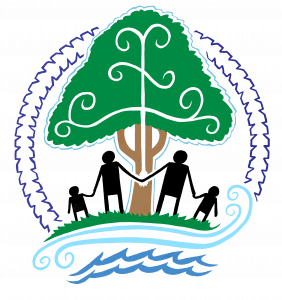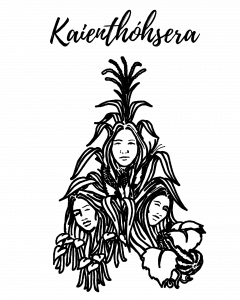Environment Program
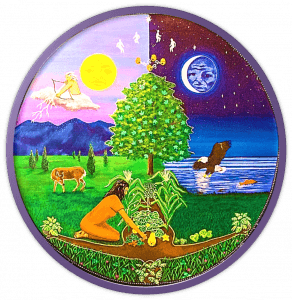
Mohawk Council of Akwesasne Environment Program is located at CIA III 101 Tewesateni Rd., Kawehno:ke , Akwesasne, ON K6H 5R7
Phone: (613) 936-1548 Fax: (613) 938-6760 Open: 8:00 a.m. to 5:00 p.m. – Monday to Friday
Services:
In the tradition of the Ohen:ton Karihwateh:kwen (The Words That Come Before All Else), the Environment Program strives to better understand, protect, maintain, and enhance the natural environment of Akwesasne. We acknowledge the contributions of all elements of creation and strive to ensure that projects within our community adhere to safe environmental practices while keeping aware of current environmental and health issues. We are also committed to sharing knowledge of our Environment through Education and Connection to Community.
MCA Environment News
We are collecting information from the community on their knowledge and connection to Black Ash as part of our Black Ash Stewardship Project. Through this project we hope to conduct interviews, connect community members to those who currently practice basketmaking and gain feedback on what conservation could look like within our community. To participate in the initial survey, click the link below!
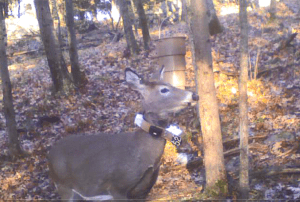 2024 Hill Island Herd Reduction
2024 Hill Island Herd Reduction
Dates:November 30th and December 1st (MNCC) & , December 7th & 8th 2024 (Personal)
MCA Contact: Taylor Mitchell or MNCC Contact
RSVP by November 23rd, 2024
Mohawk Nation Contact: Tyson Tathe Thompson RSVP by November 23rd, 2024
This hunt is organized in partnership with Mohawk Nation (MNCC), MCA Environment and Parks Canada. Sign-ups for this hunt are mandatory to participate and hunt information packages can be picked up in Kawehno:ke at CIA III by calling Conservation – 101 Teweseteni Road.
For more information, or to book your appointment contact Taylor Mitchell: 613 575 2250 Ext. 1047 or via email: taylor.mitchell@akwesasne.ca
AFSAR Projects (2022-2025)
Project Title: Understanding Sturgeon to Protect Our Future – details coming soon!
Project Title: Reclaiming Connectivity Through Forested Landscapes in Akwesasne – details coming soon!
Outreach Callout:
We are actively seeking connections to individuals who wish to share knowledge or teach skills to Akwesasronon. As a general callout, we are seeking: artists, photographers, knowledge holders, traditional teachers, and workshop hosts (trapping, skinning, hunting, fishing, basketmaking, log pounding, horticulture etc.) to support programming and environmental education on an ongoing basis. We typically post specific Call-Outs on our social media pages (MCA, or Environment). We would like to maintain a roster of interested teachers for single year periods (March to March) (or longer if your email suggests ex: I would like to be on the Outreach Callout List for a period of 5 years), let us know how to reach you, and what skills you would like to present by contacting us:
Social media platforms (Facebook)
OR
by email: melanie.alguire@akwesasne.ca
Compensation:
Compensation changes based on project funding. Examples are: interviews may be compensated via gift card, or honoraria; workshops and skills teaching can be compensated via Honoraria, or at times, provision of supplies. Please reach out if you have questions, or to check to see if we are seeking your special skill!
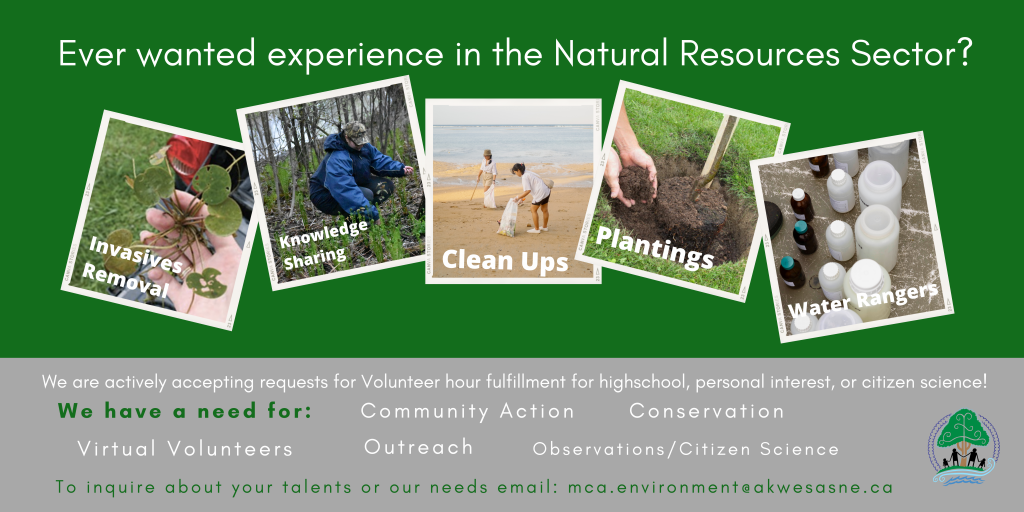
MCA Environment Past Project Highlights
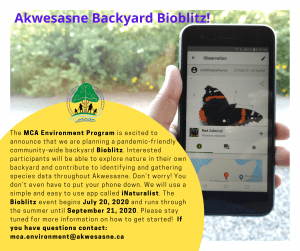
“Bioblitzing” is a citizen effort to track and monitor species that exist in our communities. We encourage all to get outside, become familiar with our native, aggressive and invasive plants to better utilize them, and gain knowledge on management. As part of our summer programming, our Summer Students can teach you, your class or your family how to bioblitz and start you off on your Species ID journey!
Under the Kaienthóhsera Raised Garden Bed initiative, the Mohawk Council of Akwesasne is attempting to help alleviate food needs by providing raised garden beds to individual households. Each kit includes an 8’x4’x1′ raised garden bed that will be delivered and installed to the residence. The soil will be provided as well as a tray of plants to be planted by the residence. For individuals with or without gardening experience, we will be providing information to help individuals be successful in their food growing with all the information being grounded in who we are as Akwesasronon.
We would like to extend a big niawenhkó:wa to Akwesasne Earth Movers, Northern – Landscapes, and Two House Design-Crafters for making this project possible!

Our Team:
- Kayla Sunday, Manager of Environmental Services
- Claire McFaul, Environmental Science Officer
- Taylor Mitchell, Conservation Officer
- Nathan Seymour, GIS Technician
- Curtis Lazore, Environmental Assessment Officer
- Jess Thompson, Environmental Assessment Officer
- Jacey Hall, Terrestrial Project Coordinator (Flood Mapping 2024)
- Britney Bourdages Environmental Project Coordinator / St. Lawrence River (Kaniatarowanenneh) Area of Concern
- Logan Lazore, Environmental Field Technician
- Maegan Mitchell, Environmental Field Technician
- Melanie Alguire, Environmental Educator
- Vacant, Forestry Technician
- Vacant, Waste Coordination
- Vacant, Canadian Coast Guard Liaison Officer
When you contact the Environment Department your call will be directed to the person best suited to assist your needs.
What do I do:
All you need to do is contact our department and make an inquiry or request. You only need to care for your environment, our Mother Earth. Our team is small but mighty, so a great way to ensure response, is to contact via email. Our staff can then connect with you when they get in from the field!
Where do I go:
Cornwall Island Administration Building, (CIA #3) is the old Lacrosse Factory on Cornwall Island. Enter the door located on the south side of the building and turn directly left to speak to anyone in the Environment Program Office.
Links To Some of Our Projects
Akwesasne Task Force on the Environment
The Healing Place (plentycanada.com)
“The Environment Program will strive to protect and enhance the natural environment of Akwesasne”
The Environment Program within the Department of Tehotiiennawakon strives to achieve Sken:nen for all of creation by undertaking programs, projects, and services that respect, protect, and preserve the natural world.
Values
The Environment Program will use the Ohen:ton Karihwateh:kwen (The Words That Come Before All Else) as our Environmental framework and Sken:nen (Peace), Kasatstensera (Power) and Ka’nikonriio (Good Mind) as our guiding principles.
Ionwa’nikonri:io “We All Have a Good Mind”
Culturally Based Environmental Assessments
Developed from Traditional Teachings – Ohen:ton Karihwahteh:kwen (The Words That Come Before All Else)
– 2 Mohawk Environmental Assessment Officers
– 30 environmental assessments conducted annually divided between: Infrastructure, Housing and Leasing
Harmonized environmental assessments completed to date:
– Three Nations Bridge Crossing North Channel Bridge
– Port of Johnstown Redevelopment Project
Environment/Conservation Areas of Focus
– Contaminants
– Forestry
– Environmental Education
– Environmental Assessments
– Fisheries
– Wetlands
– St. Lawrence River (Kaniatarowanenneh) Area of Concern
Special Projects
– Agricultural Advisement
– Species at Risk
– Naturalized Knowledge System Practices
– Wetland Habitat Assessment, Conservation, & Education
– Shoreline Erosion Best Management Practices
– Removal of Aid to Navigation Batteries from River
– Conservation Education

